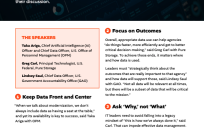As a continuation of my podcast series, Conversations on Big Data, I sat down with Lisa Danzig, Associate Director for Personnel and Performance, at the Office of Management and Budget (OMB), to discuss her experience using analytics at HUD and OMB to increase operational performance. These podcast conversations are designed to broaden the perspective about quantitative analytics, share lessons learned about what worked well and what did not, and provide specific examples of benefits gained.
Prior to joining OMB, Lisa was Director of Strategic Planning Management at HUD, where she was instrumental in leveraging program performance data through the HUDStat program. I discussed Lisa’s experience at HUD in an earlier blog. Today, I’d like to share with you Lisa’s advice on implementing analytics programs, which are surely going to guide her plans at OMB.
Organization Culture. Lisa says “so I think the first thing I learned is that this is really hard. I think one of the reasons that I was attractive for the role at OMB … is because I’ve had the experience … implementing it versus talking about it.” During our conversation, Lisa shared many of the challenges involved in implementing analytics – many of which are cultural – and strategies to help move the culture toward embracing analytics. One of those challenges, for example, is to get people to realize that “failure is OK” in the context of continuous learning and improvement. A strategy that Lisa used at HUD to address that cultural shift is promoting a strategy of achieving a “good” – but not necessarily “perfect” result.
Data Quality. Another important tip Lisa shares is “that it’s important to start with the data you have.” “Starting the conversation starts to shed light on the information that you have and improve it inherently just by shining a spotlight on it.” She states quite clearly that, while data quality and data lag are big challenges, the most effective solution is to roll up your sleeves and do what it takes to address these data issues. “It takes some muscle, and it’s a little tedious, but I think you can make it happen.” She advises that it will take time to figure out what the data issues are, implement a resolution, and evaluate results, but it will ultimately pay off.
Collaboration. Collaboration is another critical element for building a successful analytics program. Lisa emphasizes the “importance of building trust so that people feel they are invited to a collaboration about problem-solving and not like they’re on the hot seat and need to be defensive.” She describes a “fine line” between accountability as far as meeting goals and trust that elicits candid discussions of challenges and shortcomings. Without the trust element, people are less forthcoming and less willing to be creative. There are also situations where collaboration with a partner is required. These partners include:
• Intra or inter-agency partners to help provide data or to accomplish a specific business goal
• Industry partners that can be leveraged for support regarding best practices
• Technical partners that can help address technology gaps
Business Value. Analytics provide more value when there is focus on a clearly articulated business problem. To illustrate this, Lisa told me a joke about “the man who lost his keys. He was looking for them on the ground, and someone came along and said, did you lose your keys? And he said yes. So she said, well did you lose them here? And the man said, no, I lost them over there, but this is where the light is.” She has found that organizations tend to collect data in large repositories without any particular reason why or standards about what the data applies to. “So I think starting with what’s your problem or goal … is fundamental to making this relevant and useful.” Even when it comes to Big Data, Lisa is a fan of keeping it simple, even as she recognizes the powerful potential of what can be accomplished by leveraging Big Data.
Celebrate Success. Last but not least, Lisa says, is “the importance of celebrating success.” Analytics programs can be so large, complex, and time-consuming that the sheer amount of work to be done can be overwhelming. By just “finding a couple of examples where people are modeling … behaviors, using data to make decisions, and it doesn’t feel so overwhelming”. Success should be clearly defined and strategy needs to ensure that each iteration of work provides increasing increments of success.
To hear the full interview with Lisa or our interviews with other leaders in big data analytics, please visit Conversations on Big Data.





Leave a Reply
You must be logged in to post a comment.